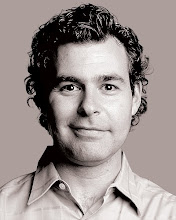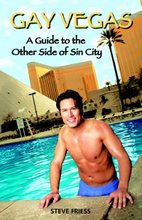Wednesday, August 8, 2007
To Bleep or Not To Bleep
Those of you who joined us last night for the taping of this week's episode of "The Strip" know that the comic magician The Amazing Johnathan made some shocking remarks in a defense of sorts of Michael Richards, the Seinfeld alum whose racial epithets on stage last November became a major scandal.
In the process, AJ used the "n" word five times and the "c" word twice. It is jarring audio, to say the least.
I am, this morning, seeking counsel from journalism ethicists who contemplate these matters often on whether to post the podcast version with or without bleeping out the offensive words. Miles is firmly advocating bleeps and I understand his view.
There are arguments on either side that are strong. My personal belief is that bleeping such words desensitizes people to their impact, does a disservice to the cause of showing just how ugly the world can be. I'm particularly perturbed when journalists dash-out, bleep or use the term "the n word" (as I did above, I know) when discussing the word itself. Not even in a semantical context can the word be spelled out, which I find very odd.
A podcast is not regulated by anybody nor is it, in our case, owned by a corporation. But I, too, am a media entity, an author and journalist for many important publications and I need to be cautious about what we end up doing. Any use of the actual word, whether I like it or not, is radioactive in this culture, and that radioactivity won't merely poison the person who actually said it.
I am interested in your thoughts, although this decision won't be made democratically. There is my own idealistic and, in my own mind, well-reasoned defense -- and then there is the reality of the real world. The real world, of course, is what pays our mortgage.
In the process, AJ used the "n" word five times and the "c" word twice. It is jarring audio, to say the least.
I am, this morning, seeking counsel from journalism ethicists who contemplate these matters often on whether to post the podcast version with or without bleeping out the offensive words. Miles is firmly advocating bleeps and I understand his view.
There are arguments on either side that are strong. My personal belief is that bleeping such words desensitizes people to their impact, does a disservice to the cause of showing just how ugly the world can be. I'm particularly perturbed when journalists dash-out, bleep or use the term "the n word" (as I did above, I know) when discussing the word itself. Not even in a semantical context can the word be spelled out, which I find very odd.
A podcast is not regulated by anybody nor is it, in our case, owned by a corporation. But I, too, am a media entity, an author and journalist for many important publications and I need to be cautious about what we end up doing. Any use of the actual word, whether I like it or not, is radioactive in this culture, and that radioactivity won't merely poison the person who actually said it.
I am interested in your thoughts, although this decision won't be made democratically. There is my own idealistic and, in my own mind, well-reasoned defense -- and then there is the reality of the real world. The real world, of course, is what pays our mortgage.
Labels:
amazing johnathan,
journalism,
michael richards,
the strip
Subscribe to:
Post Comments (Atom)








8 comments:
isn't podcasting about breaking free of the shackles of the MSM? let it air!
Unbleeped. If it's shocking, the full shock value will come across without hiding. As everyone knows what he is saying, why hide it, like the proverbial elephant in the room.
But you have to live in reality, and it's a sad reality if you broadcasting the actual words of someone you are interviewing can come back on you and cost you the mortgage payments.
Not having heard the interview, I can't comment any more than that, and realise that you may have much more sensitive listeners than me, and corporations who keep an eye on you when deciding to hire you for their magazines.
As long as the language is in the context of his commentary, then playing it is simply accurately reproducing fact. Your podcast isn't the nightly news where such language might give the old geezers who watch it a fright. As long as you mark it as Explicit for iTunes, and preface the interview with a warning about the strong language, I think it's fine. I understand Miles's position, but he comes from a background of having to be super-sensitive and quick to censor in order to protect the station from complaints from the puritanical right and the PC left. But that's not you. As a journalist, you are in the position of presenting not merely the first draft of history, but instead you're producing primary documents from original sources. So let the language and the context speak for itself. And don't be a pussy. ;)
The beauty of the podcast interview is that there is no filter between the interviewee's mouth and the listener's ear. You can hear everything in its proper context and make up your own mind about one's intent.
Personally, I'm more offended by "the n-word" than I am by the n-word.
I wish we would use this word all the time, so that it had no importance and we would become desenitized to it. I fear we have made it more important and hateful by restricting it the way we have the last 10 to 15 years. This hasn't eliminated its use, just made it somehow more important. The opposite of what we should want to see happen. We should trivialize it so no word can offend like this. Run it, and lets all yawn.
I do however, support whatever decision you reach. Thanks for the fine podcast.
Is any of these people who have commented on this here black? Or journalists? Just wondering. I don't think we understand the matter well enough unless we're in their shoes. And Steve and Miles have their careers to worry about, too. I say bleep it -- it's ugly speech and I can "get" it even if it's bleeped.
I am white but married to a black woman. Her POV is that it is a powerful word that stirs up incredibly dark images of a time that is, 150 years later, still an enormously disgusting period of American history. As a white man, I personally can't relate to the level of negative emotions that the word conjures. It is offensive to anyone, but to the black community it is an amalgamation of all things negative. Or, put another way, you might not get along with your brother. But, as soon as someone outside the family hurts or insults him, you'd probably be the first to defend him. In the same way, as soon as someone outside the black community uses the word (or allows the use of the word) in any sort of context, it becomes an affront to the whole community. Sure journalists should report the facts. But, would you also post a recording of a woman being raped? Or, a man being lynched? So, I don't know if the benefits of the uncensored version are such that they outweigh the negatives.
Jeff Leatherock said above:
" I fear we have made it more important and hateful by restricting it the way we have the last 10 to 15 years. This hasn't eliminated its use, just made it somehow more important."
Exactly. Until the OJ trial in '95, non-racists could say "nigger" in public or in the media if they were having a rational discussion about words or bigotry as opposed to using it to malign an individual or race. In the same contexts as one uses the term, "the 'N' word" today, one could simply say "nigger," until '95, instead, without causing the sky to fall.
It was in the OJ trial, that Johnnie Cochran succeeded in attributing to the mere articulation or printing of the word a power and effect it had never had to that point.
By pretending that the mere sound of the word was so toxic that it would damage society by its mere articulation, he was able to deflect attention from the double homicide and to exaggerate the importance of the use of the word as a racial epithet by a prosecution witness who, while a racist, nevertheless gave damaging factual testimony that could not be impeached other than by the red herring of his having used the word "nigger" in the past.
The prosecution, attempting to make nice with the almost all Black jury, also adopted Cochran's replacement phrase, and then the MSM in lockstep and fear made it official: You couldn't say "nigger" on TV anymore, even when using the word to decry its use by bigots.
Of course, the sound of the word apparently does not damage the psyches of the young or others who listen to hip-hop lyrics -- some segments of the culture have always been exempt from the repression. Surreal.
I hope you have the courage to run the show without bleeping the word, but it is a fascinating conundrum for you. There really is not a precedent for this situation. That's what makes it so interesting.
You have already run it uncensored as streaming audio. What you streamed yesterday had been recorded earlier, so the magician did not catch you unaware. Why would you run it uncensored as a stream but then bleep the downloadable mp3 file? What's the difference? Is it because there is a corporate middleman with respect to the file, i.e. Apple or other aggregators of podcasts?
As far as I know, you can't say "nigger" on CNN etc., but you *can* say it in a blog or internet forum without repercussion so long as it isn't hate speech but is used in a dispassionate discussion, as here. But then, you are a "big" podcast, maybe on the cusp of making it into the "bigtime." You've already made it into the bigtime print MSM in a pretty spectacular way, I must say. There have been some famous career ending incidents by the ill-advised use of a single word, so I appreciate what Miles is saying.
On the other hand, *you* didn't use the word. You are not the Jimmy the Greek or Kramer in this situation.
Running it unexpurgated with a warning and maybe a well-written rationale as to why it should not be bleeped seems to me to be a viable option. It could spark a lively debate in the blogosphere or even in the wider world and increase your visibility in a good way.
Post a Comment